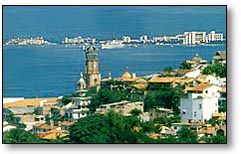
PUERTO VALLARTO
An Introduction
Next
to Acapulco, Puerto Vallarta is Mexico's second great Pacific playground. The
city sits  almost exactly
midway down the Pacific Coast, on Mexico's largest natural bay - the
Bahia de Banderas. Every spring, humpback whales wind their way from
Alaska to gather in the bay's shallow waters, and some simply call it
Hump- back Bay.
almost exactly
midway down the Pacific Coast, on Mexico's largest natural bay - the
Bahia de Banderas. Every spring, humpback whales wind their way from
Alaska to gather in the bay's shallow waters, and some simply call it
Hump- back Bay.
Puerto Vallarta, still small enough to be called a "village" by
the local tourism board, is bisected by the Cuale River and encircled
by the densely
forested western slopes of the Sierra Madre. The mountainous, tropical backdrop
adds immensely to the city's charm. Vallarta was a sleepy fishing village until
the 1960s, when Richard Burton and Elizabeth Taylor came here to film Night of
the Iguana on Mismaloya Beach. After that, the town's reputation as a tropical
paradise spread quickly.
Vallarta has an abundance of restaurants, art galleries, markets, beach activities,
and hotels. One of Vallarta's advantages is its proximity to the selva, or jungle.
Day trips to the jungle are easily arranged in town, or you can rent a car and
explore yourself. Not far from the town are several quaint fishing villages such
as Las Animas, Yelapa, and Quimixto. Anyone visiting Puerto Vallarta should head
a few miles south of town to gaze upon Los Arcos, a natural, sea-carved arch
that sits about 500 yards off shore. Those wishing to jump across the Gulf of
California to Baja can take an overnight car ferry from Vallarta to Cabo San
Lucas.
Copyright (c) 1998-2008 interKnowledge Corp. All rights reserved.
